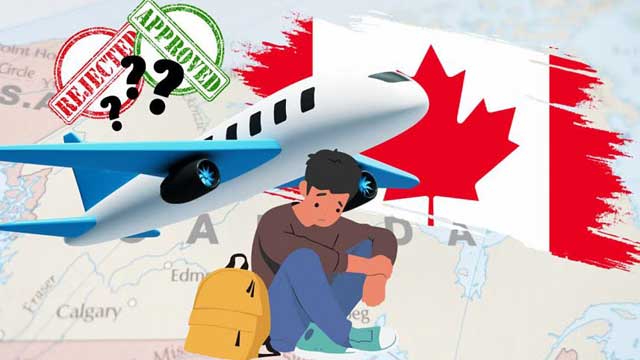The Canadian government has announced a 35 percent reduction of visas issued to international students at the undergraduate level for 2024 and 2025. The government has also raised the cost of living requirement, raising it from 10,000 Canadian dollars to 20,635 Canadian dollars.
For Bangladeshi students, many of whom consider Canada a primary target for education abroad, these decisions are forcing them to change their plans.
last decade, with the number of study permits issued for Bangladeshi individuals rising from 1,365 in 2015 to 9,535 in 2023, according to data reported by IRCC (Immigration, Refugees and Citizenship Canada). These numbers were all but set to keep rising in the years ahead, but following these changes, students are having to reconsider their future.
Shafaat Razin, a student at SFX Greenherald School who is about to sit for his A-2 Level exams, is looking to go to university in Canada this fall. He applied to two universities -- Carleton University and York University -- specifically because of the scholarships available there for programmes he was interested in. But the visa restrictions have dealt a huge blow to his motivation.
"I had personal reasons to go to Canada and have been working towards it, but now, even if I do get my scholarships, I don't know if the visas will be approved," he said.
Shafaat explained that he had to spend around Tk 30,000 for his two applications, but that was before he knew about the visa restrictions.
"The timing of the government's announcement could have been better. With the expenses related to applying, and if students knew before, they may have decided differently," he added.
For many students, the pull of family members living in Canada and the fact that many students have previously gone there is a big factor.
Sreya Shemonty, a high school student planning to go to university later this year, had initially planned to go to Canada, having applied to four universities there. But now, she's applying to universities in the US and Australia as well.
"It has definitely affected my future plans. I was sure I was going to Canada, but now with this situation, I have to plan for other places. I have relatives in Canada but now if I go elsewhere I have to adjust, which will be more difficult," she said.
Why these restrictions?
According to the IRCC statement announcing the restriction, "Rapid increases in the number of international students arriving in Canada also puts pressure on housing, health care and other services. As we work to better protect international students from bad actors and support sustainable population growth in Canada, the government is moving forward with measures to stabilise the number of international students in Canada."
The housing crisis in Canada, especially, has been a hot topic of discussion in the country, with the Canadian deputy prime minister saying in early February, "It's a central challenge in people's lives, and this is especially true for Canadians who are struggling with the high cost of rent."
According to data from the 2021 National Census of Canada, one in every seven owned homes were deemed too expensive for their occupants, and the ratio was one in every three for rented homes. While it is heavily debated whether immigrants and international students have contributed to this housing crisis, it is part of the public discourse and the government has responded to it with these restrictions.
Spoke to Anindya Chowdhury, managing partner and CEO of Mentors' Study Abroad, to get an industry perspective of what these changes mean to Bangladeshi students.
"From recent experience, we can tell from the footfall that queries for Canadian admissions have gone down at least 20 percent in the last six months. There is negativity among students. They have come to us and mentioned what they saw in the news, but the way we see this is that it's a 35 percent reduction of visas worldwide, not just for Bangladesh. Students think they will be the ones to not get a visa, but strong profiles will still get preference," he said.
Regarding problems students may face right now, he said, "The IRCC mentioned that visa applications will now require attestation letters from provinces, and universities have been asked to come up with a system by March 31 to coordinate with the provinces and provide students these letters. Right now, this system does not exist, so students who may need to go to Canada in May are in an uncertain position."
He added that the raised living expense requirement will impact students as well, as they are required to show availability of funds for one year's worth of tuition and living costs.
Admission agencies like Mentors' and students said they have received communications from universities that they will be updated as more information is available on new visa conditions, specifically regarding attestation letters.
While Canada is a major destination for students looking to study abroad, it is still one of several options for Bangladeshi high school students, who will have the option to look elsewhere.
Shadman Khan Chowdhury, a graduate from Sir John Wilson School who has applied to three universities in Canada as well as some US colleges, sums it up, "I am a bit worried, but at the same time, I can't do anything about it. After hearing about the visa restrictions, my thinking has shifted more towards the USA, but my plans haven't exactly changed as visas have always had a luck factor."





